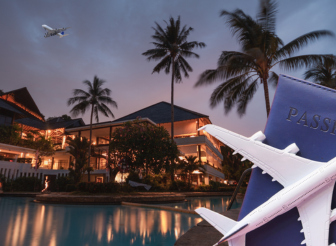The government’s new ‘traffic light system’ continues to throw up all sorts of new questions. On the back of our Hot Topics Webinar earlier this week, our panel of experts were asked:
What liability does a tour operator have where a customer is returning home to Scotland from a country marked ‘red’ on the English traffic light system, and is transiting through London Heathrow airport?

The implication here is that the traveller will be obliged to quarantine in England for 10 days, thus incurring costs for a hotel and a replacement flight back to Scotland. Our assumption here is that the package included the flight back to Scotland as part of the package. With that in mind, let’s take a look at what costs a tour operator may potentially be obliged to cover in that scenario.
Accommodation costs
In this scenario the tour operator has been unable to ‘ensure the customer’s return as agreed in the package holiday contract’, i.e. the end point of the holiday as per the itinerary. On that basis, the starting point here is that the tour operator is obliged to cover a maximum of 3 nights accommodation costs at the hotel in London.
There are, however, some situations where the liability is not capped at 3 nights and thus the full 10 days may be recoverable. The categories of travellers entitled to recover the full 10 days of accommodation costs are set out at Regulation 15(15) of the Package Travel Regulations here and include: pregnant women, unaccompanied minors, disabled persons and persons with reduced mobility (criteria applies) and persons with specific medical assistance (provided the tour operator was notified of those particular needs at least 2 days before the start of the package).
There is also an exception where a tour operator will not be obliged to cover any of the costs of the accommodation in London at all. That would be where the traveller is somehow ‘at fault’ for finding themselves in this situation, i.e. for ‘failing to take all reasonable measures’ to avoid that scenario. An example of that, perhaps, would be where the tour operator warns the traveller that the lights are changing from ‘amber’ to ‘red’ and offers an early flight back to Scotland in order to avoid quarantine in London. The traveller, however, insists on ‘seeing out their holiday’ and refuses that return flight.
Repatriation Costs
The tour operator would only be liable for repatriation costs where the need to quarantine in London stems from a failure to provide the travel services as expected. For example, if the original flight back to Scotland as per the package were cancelled, and because of that delay the customer finds themselves having to quarantine in London, in that scenario the tour operator would be obliged to cover any repatriation costs using equivalent transport (e.g. a flight back to Scotland). We should emphasise that, in this example, it matters not why the flight was delayed. There are some obligations under the Package Travel Regulations which tour operators can avoid where they can demonstrate the cause to be due to ‘unavoidable and extraordinary circumstances’, but this is not one of them!
Refunds / Price Reduction
Tour operators may be familiar with the scenario where a holiday is ‘cut short’, and the customer can cancel the holiday and obtain a partial refund (or a ‘price reduction’, to use the wording of the Package Travel Regulations). Again, a tour operator would only be liable for a ‘price reduction’ where the need to quarantine in London stems from a failure to provide the travel services as expected (e.g. the original return flight was delayed).
However, even in that scenario, by this point the holiday is essentially over. Almost all of the travel services have been provided so there is not a lot left to refund! At best, the traveller could say that they are entitled to a refund for their original return flight back to Scotland that they were ‘unable to make use of’. However, in this scenario the traveller is entitled to repatriation costs back to Scotland. It would not therefore seem ‘appropriate’, to use the wording of the Regulations, for the traveller to receive a refund for both, a) the original flight cost, and b) the cost of the replacement flight. That would be a form of ‘double recovery’.
Compensation
In all of the scenarios above that we have looked at so far it has been necessary to consider the reason why the traveller has ended up having to quarantine in London. The same applies here. So the answer is, yes, it is possible that a customer could be entitled to compensation for ending up stuck in a hotel in London for 10 days; however that would only happen where:
a) There has been a failure by the tour operator to perform the travel services as expected; and
b) The tour operator is unable to demonstrate that this came about due to ‘unavoidable and extraordinary circumstances’.
So, unlike the example above in relation to ‘repatriation costs’, this time the tour operator can avoid liability for compensation where the cause is due to ‘unavoidable and extraordinary circumstances’.
Conclusion?
It seems to us that, in most cases, customers will be entitled to 3 nights accommodation, but nothing more (meaning that the effective cost of the 10 nights is potentially split 70%/30%). However, we must always ask the question as to ‘why’ the customer ended up having to quarantine in London. The answer to that question is important because one traveller might be entitled to the full 10 days accommodation plus repatriation back to Scotland plus compensation, whereas another traveller might not be entitled to anything, not even the 3 nights accommodation!
Get In Touch
If you require further advice on any of the issues raised in this article, please get in touch with the writer of this article, Nick@Travlaw.co.uk, or any member of the team at advice@travlaw.co.uk.

If you require further advice on any of the issues raised in this article, please get in touch with the writer of this article;
or any member of the team at advice@travlaw.co.uk.
This article was originally published on: 15 July 2021



